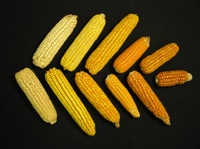OK. Mea culpa. Jorge Mayer, Manager of the Golden Rice project, rightly took me to task for using out-of-date data about the carotene content of the new generation of Golden Rice. The project’s web site says:
The recommended daily allowance (RDA) of vitamin A for 1-3 year-old children is 300 µg (half the RDA is enough to maintain vitamin A at a normal, healthy level). Based on a retinol equivalency ratio for Beta-carotene of 12:1, half the RDA would be provided in 72 g of the new-generation Golden Rice. This is perfectly compatible with rice consumption levels in target countries, which lie at 100-200 g of rice per child per day.
I confess, I did not find that, as it wasn’t actually my primary concern. My primary concern was to ask whether the approach Golden Rice embodies, its mindset, if you will, is actually going to deliver the goods as effectively as some other approaches. Is it, for example, what vitamin A deficient people would choose for themselves?
The Golden Rice project’s home page says that:
The best way to avoid micronutrient deficiencies is by way of a varied diet, rich in vegetables, fruits and animal products.
The second best approach, especially for those who cannot afford a varied diet, is by way of nutrient-dense staple crops.
It then goes on to explain how some cereals, such as rice, are capable of producing provitamin A in the leaves but not in the grain, because some of the necessary genes are switched off in the grain, and how the inventors of Golden Rice inserted those genes from other species “to account for the turned-off genes”.
So far so good. And maybe that’s as far as things need to go. But here is where I part company from the project.
In the most remote rural areas Golden Rice could constitute a major contribution towards sustainable vitamin A delivery mechanisms. To achieve this goal a strong, concerted, and interdisciplinary effort is needed. This effort must include scientists, breeders, farmers, regulators, policy-makers and extensionists. The latter will play a central role in educating farmers and consumers as to their options. While the most desirable option woud be a varied and sufficient diet, this goal is not always achievable, at least not in the short term. The reasons are manifold, ranging from tradition to geographical and economical limitations. Golden Rice is a step in the right direction in that it does not create new dependencies or displace traditional cuisine.
And right below that paragraph is a crosshead that reads:
Golden Rice will reach those who need it at no additional cost
Note that “consumers” are passive recipients of education. I really do not see the chain that binds Golden Rice to “the most remote rural areas” “at no additional cost”. How are those people going to get their Golden Rice? As a handout, in perpetuity? As a supply of seeds? Furthermore, and this was my original point, if a varied and sufficient diet is the most desirable option, is there not a danger that the inherent sexiness of Golden Rice and the scientific attraction of cutting-edge genetic engineering could possibly be creating a funding well that draws in support to the detriment of that most desirable option? Why, indeed, is that most desirable option not always achievable?
Golden Rice, as a poster child for engineered biofortification, has come a long way. Those promoting it have become much less strident and have sought to build alliances. But I haven’t seen anyone willing to give the most desirable option — a varied and sufficient diet — a fair crack of the whip.
That was my point. I’m happy to concede that Golden Rice could deliver provitamin A. I’m just still not sure it is the best way to do so.
